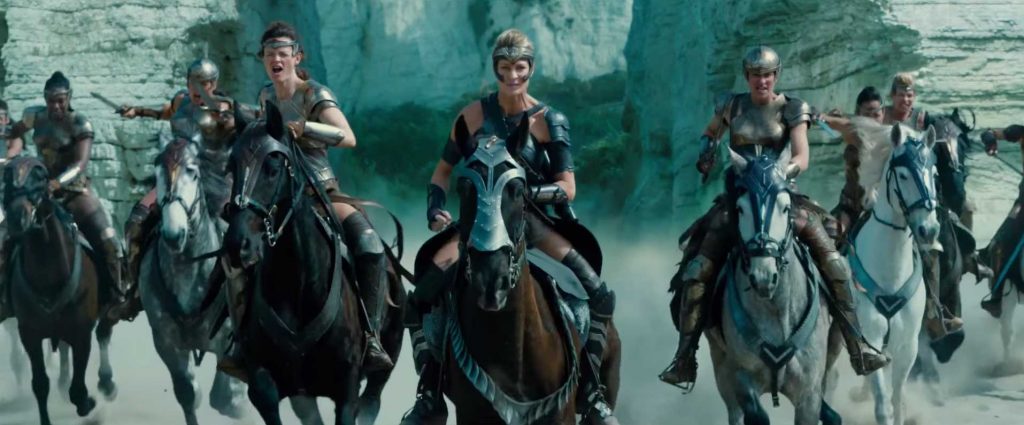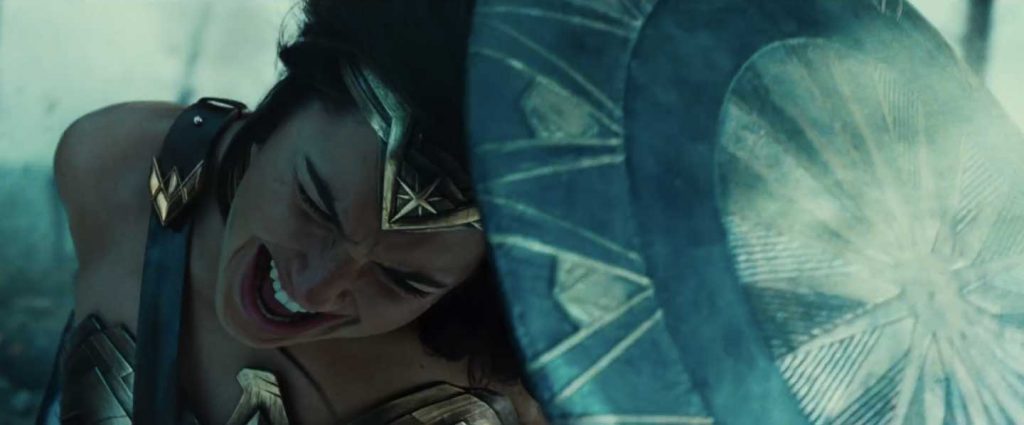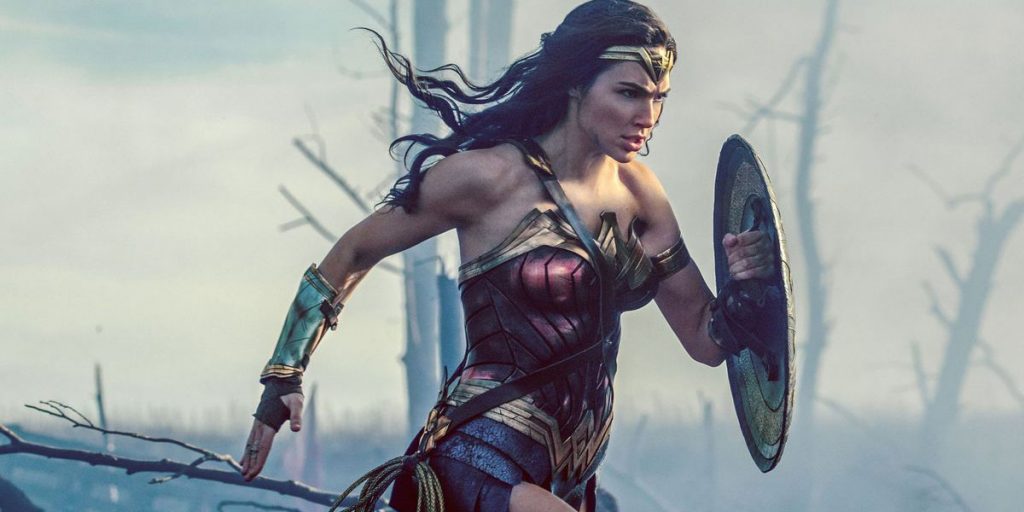Wonder Woman is fierce feminist filmmaking at its finest, preserving its potent power and progressivism even three years after its initial release.
On this day, in an alternate universe, we would all be settling down in our seats at the cinema, with a tall tub of popcorn in our lap and a bubbly bottle of pop by our side, to catch one of the first showings of DC’s standout summer sequel, Wonder Woman 1984. Unfortunately, 2020 has had opposing arrangements in lieu of our usual activities. With COVID-19 constricting our ability to access theaters across the globe, we have been left without a traditional “summer movie season,” and Wonder Woman 1984 is this week’s current casualty. However, even though our moviegoing habits have been halted for the near future, this does not have to keep us from creating our own exclusive and inventive release calendar to celebrate cinema in the meantime.
In the first of a series entitled “Flashback Films,” in which I will be rewatching and reviewing the predecessors to this summer’s (former) blockbusters and recommending them for alternate at-home viewing in these trying times, I revisited 2017’s Wonder Woman and reevaluated its incredible impact on both the industry as a whole and on innumerable individuals around the world. In the age of box office hits that burn bright and burn out relatively quickly, Wonder Woman proved to be an exception to this rule, opening with $103.3 million domestically but additionally going on to gross $412.6 million overall (and $821.8 million worldwide), nearly quadrupling its revenue from its first weekend in release.
This type of phenomenal performance was spurred by blazing buzz (courtesy of endlessly enthusiastic reviews from countless critics, a first for the DCEU) and rampant repeat viewings from fervent female fans who were excited to experience the first major event film starring a female superhero. Now that three years have passed and the historic hype has died down, it was time to re-analyze Diana Prince’s iconic origin story, especially with a follow-up fast approaching.

For those who are unfamiliar, Wonder Woman begins on the idyllic island of Themyscira, inhabited solely by female Amazonian warriors created by Zeus to protect mankind. Almost instantly, viewers are enraptured by this euphoric utopia, as cinematographer Matthew Jensen makes use of luscious lighting and bathes this pensive paradise in beautifully bright hues. Additionally, it is here that we first feel the importance of director Patty Jenkins (Monster)’s control beyond the camera; as we watch the Amazonians engage in captivating fight choreography, Jenkins’ firm female gaze highlights the heroism and heart of these women, first and foremost. Whereas a male director may have been inclined to spotlight the Amazonians’ “attractiveness”, Jenkins is dead-set on stressing their strength and spirit above all else. Though this change in perspective is subtle, it most certainly stands out in comparison to other present portrayals of females in superhero films (one needs only watch the initial objectification of Scarlett Johansson’s Black Widow in Jon Favreau’s Iron Man 2 or the disappointingly regressive depiction of these very same Amazonians in Zack Snyder and Joss Whedon’s Justice League to see the extraordinary difference that Jenkins’ viewpoint makes).
Before long, audiences are introduced to the hero herself, Gal Gadot’s Wonder Woman, who wholeheartedly lives up to her namesake. In sharp contrast with today’s dark and brooding (and mostly male) superpowered protagonists – such as Ben Affleck’s Batman and Henry Cavill’s Superman from this very franchise – Gadot’s Diana Prince arrives with an aura of optimism and idealism we’ve yet to witness in this subgenre. Diana feels like such a breath of fresh air because Gadot’s passionate performance pairs perfectly with Jenkins’ deft direction and screenwriter Allan Heinberg’s compassionate characterization to allow for a hearty heroine who is able to be both ferocious and feminine, simultaneously.
Diana is a dynamo on the battlefield, and she’s more than capable of dispatching enemies with ease, but she always seeks to end any strife as soon as it begins, and she shows a strikingly sympathetic concern for human life at all times. With aforementioned assists from Jenkins and Heinberg, Gadot is able to embody Wonder Woman’s inherent earnestness – a specific and unique byproduct of her gender and her all-female upbringing – while more than holding her own physically in combat and matching the might and muscle of her male peers.
This brilliant balance is most apparent in the film’s instantly iconic “No Man’s Land” set piece, in which a distraught Diana, stupefied by sights of suffering surrounding the trenches on a Belgium battleground, dismisses the doubts of Chris Pine’s Steve Trevor and courageously climbs to the warzone above before majestically making her way towards the Germans on the other side in determined defiance. This is, by far and away, the greatest example of how Wonder Woman’s endless empathy compels her to do what others will not, demonstrating how her sensitivity and her stalwartness work in tandem. As she continues to fearlessly file forward, Diana deflects a blitz of bullets with grace and James Newton Howard’s soulfully stirring score swells. Her efforts seemingly stand to symbolize not only Diana’s own resilient resistance to those who would question her capabilities but also the work of women everywhere beating back the power of a patriarchy that tries to silence them or stall their success in society (a theme that has only become exponentially timelier in the past three years).

Now, for those who worry that Diana’s undying optimism and naivete will feel “implausible” when in direct interaction with the complexities and confusion of 20th Century society (especially with the perplexing politics surrounding World War I), the previously mentioned Steve Trevor serves as a compelling contrast. As a man with a much more cynical view of human nature and humankind as a whole, Trevor initially bristles against Wonder Woman’s brightness. It helps greatly that Gadot and Pine have such charming chemistry, as these two channel classic couples of Hollywood history (think Clark Gable and Claudette Colbert in It Happened One Night or Humphrey Bogart and Lauren Bacall in The Big Sleep) to make certain that their repartee is rousing but respectful. Over time, the two adopt tenets of one another’s ideologies (with Diana realizing that there is not “one true evil” to defeat and end all adversity and Trevor coming to champion Diana’s confidence in compassion’s capacity to change the world) and together, they represent one of the most equally balanced pairings in a major motion picture indeed since the industry’s Golden Age.
Wonder Woman’s only flaws can be found with its villains – Danny Huston’s Erich Ludendorff and Elena Anaya’s Doctor Poison – who can’t help but feel two-dimensional and trite, especially when compared to our fully fleshed out protagonists. Nevertheless, the film is able to skirt around these shortcomings by emphasizing how Wonder Woman’s true “enemy” is never just one single individual (as Diana herself must come to realize); until the end of time, she must continue to combat corruption and cruelty of all kinds, and this is a conflict that will never fully be complete. Even at the end of the film, when it looks as if peace has prevailed, this moment arrives with melancholy, as Diana must admit that the war will never truly be won, and evil must always be actively opposed.
Though Wonder Woman already felt radical at the time of its release, it’s abundantly clear that its significance will only continue to grow with age, as Diana Prince has proven to be the antithesis to the anxiety and agitation that run rampant today. As both a way to prepare for Wonder Woman 1984’s arrival on August 14 and to escape the horrific hate in the here and now, there is no better movie to meet these needs than Wonder Woman.

